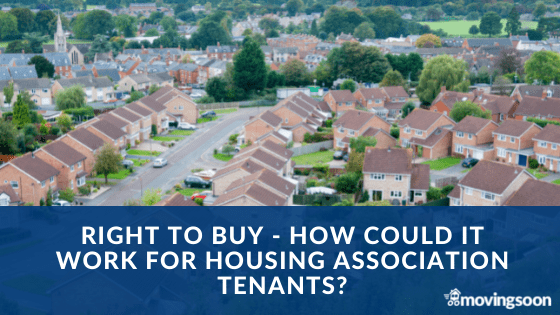So how could housing association right to buy work for tenants?
First introduced in 1980, the right to buy scheme allows eligible social housing residents the opportunity to buy their homes at a discount. Over the years, the levels of discount available and the eligibility criteria for the scheme have varied.
The current scheme is only available for those in council-owned homes, though potential future legislation may extend this eligibility to housing association tenants too. We’ve discussed all things Right to Buy for housing association tenants, its pros and cons and what that could mean for you!
What is Right to Buy?
Put simply, the Right to Buy scheme is a governmental project which allows social tenants to get themselves on the housing ladder and own their houses as an alternative to renting.
The scheme was brought forward as everyone should have the opportunity to buy a house if they want to; it is their ‘right’ to ‘buy’. Sounds interesting? In practice, the Right to Buy scheme is a good one as the discounts offered could be the key difference for someone with limited financial support.
If extended, the renewed Right to Buy for housing association tenants would benefit those who rent properties from housing associations in England. This is around 2.5 million households — or five million people.
There will be costs involved and you will to consider the likes of right to buy conveyancing fees.
Am I Eligible?
If eligible, you can buy your home and receive maximum discounts of £87,200 across England and £116,200 in London. These discounts apply at the rates of:
- 3 years – 35% discount for a house and 50% discount for a flat
- 4 years – 35% discount for a house and 50% discount for a flat
- 5 years – 35% discount for a house and 50% discount for a flat
- 6 years plus – add 1% per year for houses (up to 70% or the cash maximum – whichever is lower), add 2% per year for flats (up to 70% or the cash maximum – whichever is lower)
To make this easier to understand, consider a £200,000 house and a £150,000 flat. For someone living outside London, discounts on the house could be up to £70,000 if you have been a public sector tenant for 3,4 or 5 years.
If you have been a tenant for 6 years or more, you are eligible for a £2,000 additional discount per year. For the flat, the discount would be £75,000 for a public sector tenant of 3,4 and 5 years Then, an additional discount of £3,000 would be available per year for tenants of 6 years or more.
As discussed, eligibility has continuously changed since 1980, and with a potential extension of right to buy for housing association tenants, you can check here if you are eligible for the scheme.
Will Right To Buy For Housing Association Tenants Work?
Since first being created, the Right to Buy scheme has had its many supporters and critics.
Essentially, the scheme allows people to get on the property ladder quicker by buying a house at a discounted rate when they couldn’t previously afford the total price. However, the scheme can only work when the supply of the houses is maintained to match any new-found demand.
Currently, less than 5 per cent of the homes sold off have been replaced. This lack of new development is rapidly reducing the number of affordable homes available which is putting increasing amounts of pressure on low-income families.
Polly Neate, chief executive of Shelter, says: “The hare-brained idea of extending Right to Buy to housing associations is the opposite of what the country needs, there could not be a worse time to sell off what remains of our last truly affordable social homes”.
Whilst the Right to Buy scheme does work in principle and benefits those who can take advantage of it, it can only work when the supply of the houses is maintained.
At a time when large percentages of the population struggle financially, the reduction of available rental properties could be catastrophic. Ultimately, this is the biggest snag of the scheme. If contractual obligations are put in place and further housing developments are built then the scheme can serve its intended purpose.
How Can I Benefit?
In May 2015, the eligibility criteria were reduced from five years of public sector tenancy to three. This means you now have to be a tenant for three years instead of five before you can apply to buy your home.
If you are a housing association tenant, you will have to wait for eligibility to change and future changes. As discussed, if you wish to utilise the scheme you could be in line for huge financial discounts. These discounts will allow you to buy your home and pay a mortgage rather than continuing to rent.
Remember!
If you buy a freehold property you’ll be the outright owner and will be responsible for all of the repairs and maintenance, as most flats and some houses are leasehold properties.
You may have to pay a service charge, which covers day-to-day maintenance and could be hundreds of pounds a year or more. In addition, should there be major repair or improvement works, such as replacing the roof or windows, you will also have to cover the cost.
It is important to consider all the relevant changes you will experience as a homeowner rather than a renter before making any final decisions. If you’d like to learn more, visit a blog regarding leasehold reform.
When Will Housing Association Right To Buy Start 2022?
For housing association tenants, the direct future is unclear. So there is no actual start date for the housing association right to buy in 2022.
There are 2.5 million households and if the eligibility is updated to be bought for a discounted rate, this could have huge implications for those who continue to rely upon renting. Also, many may profit off the discount of the system; immediately selling their home for huge profits.
Whilst there is a restriction on immediate selling and future homes are not being built, it is unclear how the Right to Buy scheme could produce success long-term.


